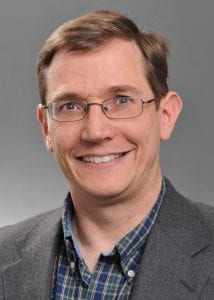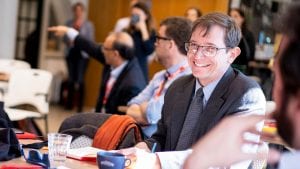38 million people face severe food insecurities, according to the Global Alliance for Improved Nutrition (GAIN). And 88% of countries face a serious burden of malnutrition, overweight and obesity, or both.
“The ultimate goal is to get people fed nutritionally, affordably, and hopefully tastily,” said Associate Professor of Economics James Manley, Ph.D.
Manley recently attended GAIN’s Inaugural Nourish Our World (NOW) event, which brought together researchers, non-profit advocates and business leaders from around the world to discuss strategies for improving nutrition, mainly for the global middle class.

“To put it in perspective, 95% of United States citizens are above the world’s standard of middle class,” said Manley. “But for developing countries like Bangladesh and Ghana, which have more money than they used to, citizens with growing disposable income are able to make more choices on how to spend their money and how to get nutritional food.”
At the conference, Manley met a couple of his heroes, including Barry Popkin, a distinguished professor at the University of North Carolina Chapel Hill, and Lawrence Haddad, GAIN’s Executive Director, whose work has been the foundation to much of Manley’s own.
Together the group collaborated in what Manley referred to as “a giant brainstorming session.” Manley contributed his research and expertise on the lack of nutritional food choices and access among impoverished populations, which fall below the middle class threshold.
Manley’s findings show that while educating people about nutrition is a good start, raising awareness about nutrition on its own is not enough.
“You can tell people all day about the importance of a good diet, but if they can’t afford it, it is not going to matter,” Manley observed.
Manley’s research has analyzed the nutritional impact of cash transfers, which are welfare programs that give households on average $20 a month to spend as they please. What he found was that people do want to eat healthier, and when they have adequate resources they do in fact eat better.
Overall, a small gift can make a large marginal impact, especially for the poorest people in the world, he said.
“With a little bit of disposable income, these people can not only make more nutritional choices, but also can think about what is next in making a life for themselves,” Manley explained.
“You can tell people all day about the importance of a good diet, but if they can’t afford it, it is not going to matter.”
For example, since jobs are sparse in rural areas, people receiving transfers can use the money to travel into the city to find work.
“The cash transfers hopefully start a virtuous cycle, and gets it all going for people in poor communities,” he said.

Manley’s experience at NOW broadened his perspective on nutritional and environmental issues: a passion he struggled to align in his own undergraduate study, but currently instills in his students at Towson University.
“As an undergraduate, I was always interested in environmental issues, but I thought economics was more or less just business. So I pursued environmental issues via sociology and later, ethics,” he said. “I didn’t realize economics was about getting the most out of available resources.”
Years after obtaining a bachelor’s degree in social psychology and a master’s degree in theology and ethics, Manley completed a master’s degree in agricultural economics and a doctorate degree in agricultural and resource economics. Now, when Manley teaches his Natural Resource Economics course (ECON 376) at Towson University, he starts off by sharing how both environmentalists and economists are focused on minimizing waste in the environment.
Through ECON 376 Natural Resource Economics, Manley helps students engage on relevant public policy issues as well as other related topics: international development, biodiversity, energy, forests, marine resources, water supply, land use, recreation, and resource scarcity. Manley hopes to equip students with the economic and ethical tools needed to improve nutrition, not only on a global scale, but in their own communities.

